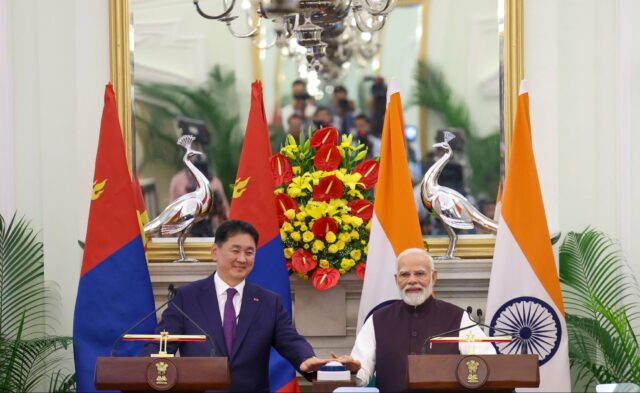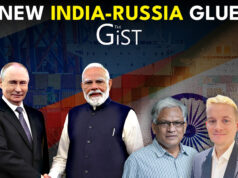“This visit is special as we celebrate 10 years of our strategic partnership and 70 years of bilateral relations,” with that Prime Minister Modi welcomed Mongolia’s visiting President Khurelsukh Ukhnaa.
President Ukhnaa signed his country’s entry into the International Solar Alliance and backed India’s campaign for a permanent seat in the UN Security Council. The two leaders released a postage stamp and then sat down for talks to enhance cooperation across defence, development, trade, energy, connectivity, culture, and spiritual ties.
“Joint exercises like Nomadic Elephant and Ex-Khaan Quest have helped strengthen our defence engagement,” senior diplomat P Kumaran said at a post-talks briefing. “Mongolia values these engagements and has expressed interest in expanding training and capacity-building programs,” he said.
India reiterated its support in continuing defence training, providing equipment, and enhancing cooperation in cybersecurity.
Kumaran confirmed that Mongolia was seeking upgrades to the India assisted Cyber Security Training Centre established for the Mongolian armed forces.
India is appointing a Resident Defence Attaché at its embassy in Ulaanbaatar, fulfilling a long-standing Mongolian request.
Energy, Critical Minerals
The ongoing construction of the $1.7 billion oil refinery in Mongolia, financed by India’s largest Line of Credit, is a flagship project in bilateral relations.
President Ukhnaa called it “strategically important for Mongolia’s energy independence” and thanked Indian companies for their role. India and Mongolia are now exploring joint oil and gas exploration, in addition to refining.
According to Kumaran, “Mongolia is keen on collaborating in exploration and prospecting. They have extended an invitation to India to invest in oil exploration in their territory.”
On critical minerals, he said “Mongolia has significant reserves of coking coal, copper, gold, and even uranium. We are exploring options for procurement and logistics, especially via the Trans-Siberian Railway through Russia, to diversify supply chains.”
Mongolia’s location and mineral wealth offer strategic opportunities for India’s resource security, especially as the two nations pursue resilient supply chains.
Improving Connectivity
President Ukhnaa stressed the need for new transport and logistics gateways and revealed plans for direct flights between the two countries.
“A Mongolian air carrier is preparing to offer charter flights to New Delhi and Amritsar later this year,” Kumaran said during the briefing.
He said both sides are evaluating the economic feasibility of such routes and are hopeful that recent visa facilitation measures, including granting e-visas at no charge to Mongolian nationals, will improve travel and people-to-people ties.
Agriculture, Dairy
During the talks, Modi had stressed India’s commitment to supporting Mongolia’s rural development.
“We are ready to collaborate in modern farming techniques, digital agriculture, and food processing, in line with Mongolia’s development priorities,” he said.
Kumaran added that Mongolia, with its vast grasslands and sparse population, is looking to develop large-scale plantations and dairy industries. India could assist in precision farming, wool processing, and value-added agri-products.
Mongolia has also invited Indian support for gold and wool industries, aiming to develop these into value-added export sectors for third markets.
Cultural Ties
India will send the holy relics of Lord Buddha’s disciples to Mongolia next year. More important is what Modi promised the Mongolian president.
“We will send a Sanskrit teacher to Gandan Monastery to support in-depth study of Buddhist texts. Nalanda University has played a vital role in Buddhism in Mongolia, and today we have agreed to strengthen this historic connection by linking Nalanda with Gandan Monastery.”
An ICCR orientation program will bring eight Mongolian students and faculty to India.
Ten MoUs were signed covering immigration, geology, yoga and others. Quick impact projects to be done by India will target small communities and are expected to improve livelihoods and social infrastructure in remote parts of Mongolia.
A highlight of the Monglian leader’s visit was the planting of a sapling under the “Ek Ped Maa Ke Naam” campaign, which echoed President Ukhnaa’s “One Billion Trees” initiative in his own country.
“This visit has resulted in substantive outcomes — both symbolic and practical. It lays a strong foundation for closer collaboration in the years to come,” said Kumaran.





